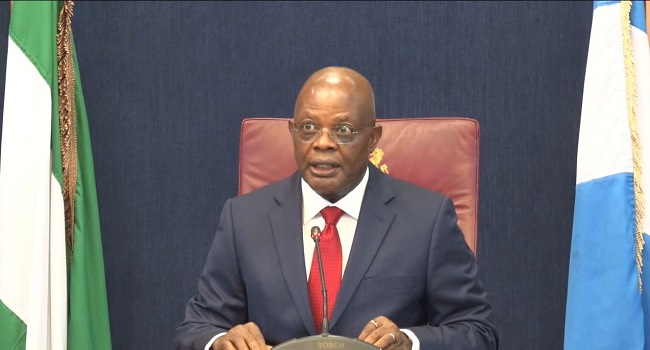The brewing conflict between the Rivers State Government and the Nigerian Bar Association (NBA) has escalated over the relocation of the NBA’s 2025 Annual General Conference (AGC) from Port Harcourt to Enugu State. At the heart of the dispute lies a N300 million payment made by the Rivers State Government to the NBA, which the state government insists was contingent upon Port Harcourt hosting the conference, while the NBA maintains it was a goodwill donation. The disagreement has spiraled into accusations of breach of trust, political maneuvering, and threats of legal action, exposing a rift between the two entities.
The Rivers State Government, through a statement issued by the media aide to the Sole Administrator, Vice Admiral Ibok-Ete Ibas (retd.), vehemently rejected the NBA’s characterization of the N300 million payment as a mere “gift.” The state government asserts that the payment was predicated on a mutual understanding that Port Harcourt would host the 2025 AGC, an event anticipated to bring significant economic benefits to the state. The government condemned the NBA’s unilateral decision to relocate the conference, viewing it as a betrayal of trust and a blatant disregard for the agreement. The state government has demanded an immediate refund and threatened to pursue legal action if the NBA fails to comply, emphasizing that the funds belong to the people of Rivers State.
The NBA, however, presents a contrasting narrative. According to Emeka Obegolu (SAN), Chairman of the 2025 AGC Planning Committee, the N300 million was a goodwill donation, unconnected to any formal hosting agreement. The NBA argues that it is within its rights to relocate the event and under no obligation to return the funds. The association cited recent political developments in Rivers State, including the imposition of emergency rule and the suspension of key government officials, as justification for its decision. These developments, according to the NBA President, Afam Osigwe (SAN), have created an environment of political instability and undermined the rule of law, making it unsuitable for hosting the conference.
The NBA’s rationale for relocating the conference stems from the perceived instability of the political landscape in Rivers State. The Federal Government’s imposition of emergency rule, coupled with the suspension of Governor Siminalayi Fubara, his deputy, and members of the state House of Assembly, has raised concerns within the NBA about the state’s adherence to democratic principles. The NBA President, Afam Osigwe (SAN), likened the current governance structure under the Sole Administrator to military rule, criticizing the perceived erosion of democratic institutions and the rule of law. The NBA posits that holding the conference in such a climate would contradict its values and potentially compromise the safety and well-being of its members.
The Rivers State Sole Administrator, Vice Admiral Ibok-Ete Ibas (retd.), has countered the NBA’s assertions, accusing the association of politicizing the situation and misrepresenting the constitutional process leading to the emergency declaration. Ibas argues that the NBA is applying double standards by accepting the N300 million and subsequently relocating the conference based on a subjective assessment of the state’s political climate. He challenged the NBA’s integrity, suggesting that if the association truly stood on principle, it should return the funds rather than profiting from a state it now publicly criticizes. Ibas views the NBA’s actions as opportunistic and hypocritical, exploiting the state’s financial contribution while simultaneously discrediting its governance structure.
This escalating dispute highlights a fundamental difference in interpretation of the N300 million payment. The Rivers State Government maintains that the payment was a contractual obligation tied to hosting the conference, while the NBA insists it was an unconditional gift. The conflicting narratives have fueled a public exchange of accusations and counter-accusations, with each side firmly entrenched in its position. The threat of legal action looms large, promising a protracted legal battle that could further strain the relationship between the Rivers State Government and the NBA. The outcome of this conflict will have significant implications for future interactions between state governments and professional organizations, underscoring the importance of clear and unambiguous agreements in such partnerships.
The dispute has also sparked broader conversations about the interplay between politics, finance, and professional organizations. The NBA’s decision to relocate the conference based on political considerations raises questions about the extent to which such organizations should weigh political factors in their operational decisions. Conversely, the Rivers State Government’s insistence on a refund highlights the potential risks associated with financial contributions made in anticipation of specific outcomes. This complex situation underscores the need for greater transparency and clarity in agreements between government entities and professional organizations, particularly when substantial financial transactions are involved. The resolution of this conflict will likely set a precedent for future interactions, influencing how such partnerships are structured and managed.














